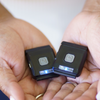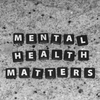The Mental Health Toll of Military Service: Understanding PTSD and Its Impact on Veterans' Lives

PTSD is an invisible illness; its cure? Time and coping mechanisms. Many veterans suffer from PTSD due to the events they’ve seen while serving their country abroad. Oftentimes, our veterans are left alone to deal with the after effects of service, including PTSD.
The first step in addressing PTSD is understanding the mental health toll military service takes on our veterans. If we don’t understand what military service does to our veterans, we’ll never be able to help them and lessen the impact of PTSD on their lives. Addressing PTSD is a great way to help veterans re-enter society.
In this article, we are going to discuss the mental health toll military service takes on our veterans, the best way to address it including using wearable stress relief devices such as our Touchpoints EDRM devices. Let's dig in!
What is PTSD
Post Traumatic Stress Disorder or PTSD is a psychiatric disorder that evolves due to witnessing a traumatic event such as a natural disaster, serious accident, terrorist act, war/combat, or any other traumatic event.
PTSD can manifest in physical or emotional symptoms such as intrusive memories, avoidance, negative changes in thinking and mood and changes in physical and emotional reactions. Each type of symptom comes with a whole host of sub-symptoms.
Intrusive Memories
- Recurring distressing memories of the incident
- Flashbacks or reliving the event over and over again
- Frequent dreams or nightmares about the incident
- Severe emotional or physical reactions to events that trigger memories of the incident
Avoidance
- Avoiding thinking about the traumatic event
- Avoiding places, people, and activities that could trigger memories of the traumatic event
- Increasingly negative thoughts about yourself or others
- Feelings of hopelessness
- Black spots or gaps in your memory
- Difficulty maintaining relationships with loved ones and friends
- Feeling detached from the world around you
- Numbness to emotions especially your own or those around you
- Trouble sleeping, trouble eating, trouble concentrating
- Feeling like you are always on guard
- Easily startled or frightened
- Feeling guilt or shame
The important thing to know about symptoms of PTSD is that they can change over time, or oscillate from severe to less severe. There is no one size fits all PTSD experience. It’s important to know the symptoms of PTSD so you can be on the lookout and make sure to get help if symptoms start or intensify.
The Impacts of PTSD on Veterans Lives
Veterans are greatly impacted by PTSD. It has only been recent years that Veterans Affairs has started to make investments in PTSD research, and care. These investments are still in the early stages, but we’ve seen an improvement in veteran lives with the focus on PTSD treatment and care.
PTSD can impact a veteran’s mental health, physical health, personal life, and work life. The symptoms of PTSD can be so far reaching that it can make it very hard for veterans to assimilate into life after war or combat.
PTSD can induce depression, anxiety, and make it difficult for veterans to hold a job or develop and keep relationships with their family and friends. Without a way to make money, and without a support system, feelings of depression and anxiety can intensify and quality of life can decrease rapidly.
Veterans with PTSD are also at risk for substance abuse issues, homelessness, and suicide attempts.
PTSD can be a very isolating experience, it is important to seek help and develop treatment methods to work through PTSD symptoms to live a happy and healthy life. Veterans with PTSD can overcome this!
Treatment options for PTSD
There are multiple types of treatment for PTSD. Often, the most effective treatments are combinations of methods. Some of the most common types of treatment include:
Therapy
Therapy can be 1:1 or in a group setting with a certified PTSD therapist to help you cope with and talk through the distressing thoughts and feelings you are having. Group therapy can be a source of community support and belonging as you will be talking with a number of people that have the same feelings as you.
Cognitive Processing TherapyCognitive Processing Therapy is a 12 session psychotherapy that teaches you how to evaluate and change the upsetting thoughts caused by trauma. The thought is that by changing the way you think about the traumatic event, you can change the way you feel about it.
Prolonged Exposure Therapy
Prolonged Exposure Therapy is a type of cognitive processing therapy that gradually introduces you to your fears, memories, and feelings about certain situations. There are two types of exposures in prolonged exposure therapy: imaginal exposure and in vivo exposure.
Imaginal exposure involves guidance from a therapist as you describe the event in detail, in the present tense as if it is actually occurring. In vivo exposure is outside of therapy work that involves you confronting stimuli that normally triggers you.
Eye Movement Desensitization and ReprocessingEye Movement Desensitization and Reprocessing otherwise known as EMDR therapy. EMDR therapy is aimed at changing the way the memory is stored in the brain.
Stress Inoculation TherapyStress Inoculation Therapy is designed to help you prepare yourself in advance to encounter stressful situations. This type of therapy is designed to educate you about the stress you are feeling, why you are feeling it, and how to recognize it before it gets past a manageable level.
MedicationsMedications can also help you deal with the symptoms of PTSD. Medication should only be used with direction from a doctor or healthcare professional. Common types of medication prescribed for PTSD include:
- SSRIs
- SNRIs
- Anti-psychotics
- Mood stabilizers
Medication might not be the right fit for you. There are other methods you can use besides medication or with medication if medication does not feel like the entirely right fit.
Alternative Therapies for PTSD Treatment
While the conventional therapies discussed earlier have been found to be effective in treating PTSD, some veterans may prefer or benefit from alternative therapies. Alternative therapies, also known as complementary therapies, are non-traditional approaches that can be used alongside conventional treatments. Here are some examples of alternative therapies:
- Yoga: Yoga is a form of exercise that combines physical postures, breathing techniques, and meditation. It has been found to be effective in reducing symptoms of PTSD such as anxiety, depression, and hyperarousal.
- Acupuncture: Acupuncture is an ancient Chinese practice that involves the insertion of thin needles into specific points on the body. It has been found to be effective in reducing symptoms of PTSD such as anxiety, insomnia, and hyperarousal.
- Equine Therapy: Equine therapy involves interacting with horses under the guidance of a mental health professional. It has been found to be effective in reducing symptoms of PTSD such as anxiety, depression, and social isolation.
- Art Therapy: Art therapy involves using creative expression such as drawing, painting, or sculpture to help process traumatic experiences. It has been found to be effective in reducing symptoms of PTSD such as anxiety, depression, and anger.
- Service Dogs: Service dogs can be trained to help veterans with PTSD by providing companionship, comfort, and assistance with daily tasks. They have been found to be effective in reducing symptoms of PTSD such as anxiety, hypervigilance, and nightmares.
-
Stress relief devices: Stress relief devices are a great way to help symptoms of PTSD as well. TouchPoints are a great option for veterans with PTSD to assist with stress relief by delivering gentle, alternating vibrations on each side of the body to shift your brain from your default "fight or flight" response to your calm and in-control response.
Touchpoints work similar to EMDR therapy, and are a great option to help you ease into life outside of a mental health professionals office.
In addition to the alternative therapies mentioned above, there are other treatments that may be beneficial for veterans with PTSD. For example, mindfulness-based stress reduction (MBSR) is a type of meditation that involves focusing on the present moment without judgment. It has been found to be effective in reducing symptoms of PTSD such as anxiety, depression, and emotional numbness. Cognitive processing therapy (CPT) is a type of cognitive-behavioral therapy that helps individuals with PTSD to process and challenge their negative thoughts and beliefs. Eye movement desensitization and reprocessing (EMDR) is a type of therapy that involves using rapid eye movements to process traumatic memories. These treatments, along with others, may be helpful in reducing symptoms of PTSD for some veterans.
It is also important to note that not all alternative therapies have been extensively studied or proven to be effective. It is important to approach these therapies with caution and to discuss them with a mental health professional before starting. Additionally, alternative therapies should not be used as a substitute for conventional therapies, as they may not be sufficient in treating PTSD on their own. Ultimately, the best course of action for treating PTSD will depend on the individual veteran's specific symptoms and needs, and working with a mental health professional is crucial in developing an effective treatment plan.
In conclusion, addressing the mental health toll of military service, particularly PTSD, is crucial in helping our veterans reintegrate into society and live fulfilling lives. It's important to understand that PTSD is not a weakness, but rather a natural response to traumatic events.
Through various treatment options such as therapy, cognitive processing therapy, prolonged exposure therapy, EMDR therapy, stress inoculation therapy, and medication, veterans with PTSD can learn coping mechanisms and improve their quality of life. Additionally, innovative technologies like Touchpoints EDRM devices offer a unique and effective way to reduce stress and anxiety in veterans. It's our responsibility as a society to support and care for our veterans who have sacrificed so much for our country. If you are a Veteran, consider trying TouchPoints as an effective way to manage your PTSD symptoms, along with additional forms of treatment.
.
.
.
Author bio:
Claire Szewczyk is a Digital Content Coordinator for Hill & Ponton, PA in Florida. She was a former US Airforce civilian employee, who worked at Hill Air Force Base, in Layton, UT as a flight testing administrator. She has also spent several years working with the Department of Veterans Affairs audiology programs in Salt Lake City, UT and Pocatello, ID. She enjoys working with the Veteran population and keeping them up to date with information they need the most.




